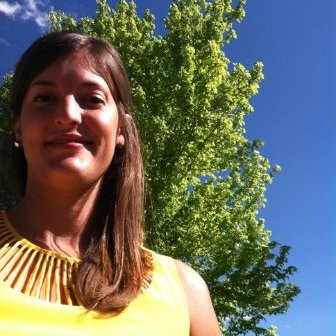
Today, multinational giant Dow Chemical officially launched a new agriculture support program in Russia as part of its commitment to mitigate the environmental impacts of the 2014 Sochi Olympic Games. DowSeeds, a unit of their agricultural division, is working with five large-scale farms across Russia to introduce their Nexera canola seed product alongside farm training programs to “optimize water and fertilizer use,” while also increasing yields. The pilot program, part of Dow’s “Sustainable Future” greenhouse gas (GHG) reduction program for the Sochi Olympics, focuses on canola farming and purports environmental, economic — and even health benefits. If you are wondering how the agriculture program ties in with the GHG mitigation program, read on.
Dr. Nicoletta Piccolrovazzi, Technology and Sustainability Director, and Sergey Belyavskiy, Business Development Leader of Dow Olympic Operations detailed the agriculture program exclusively to TriplePundit.
This agricultural pilot is being introduced as part of Dow’s Sustainable Future program in its role as the “official carbon partner” of the Sochi Games. Through a variety of technology projects in the fields of industry, infrastructure and agriculture, Dow’s Olympic team aims to offset the estimated 360,000 metric tons (MT) of GHG emissions that will be produced by Olympic-related activities. Part of that mitigation will come through the agriculture projects. Project implementation will run from 2013-2014 and Dow expects it will take ten years to reach their 360,000 MT reduction target — 100,000 MT of which should come from agricultural program activities. Dow Corporation's Sustainability Goals for 2015 involve tackling “world challenges,” including global health.
Under the two-year program, five large Russian farms — Shatsk Zolotaya Niva LLC (AgroTerra), KFH Baigora, VAPC LLC, SKPSSK Izmalkovskiy and ADVAG – Baltic Farms LLC — will have access to the expertise of Canadian precision agronomy firm Farmer’s Edge to help optimize the yields of Nexera canola seeds, which grow best under “low-till” conditions, according to the company.
“Dow’s goal with the program – comprehensive training and the introduction of Nexera seeds – is to have the farms reducing the amount of tillage they perform on the land,” Dow Olympic program officials told TriplePundit via email. By reducing tillage, farms help retain more of the GHG that is naturally sequestered in soil. Globally, agriculture is responsible for 10-12 percent of man-made greenhouse gas emissions (mainly nitrogen and methane), according to a 2007 IPCC report.
Nextera also has some health benefits. Dow currently produces four varieties of the Nexera hybrid seed, which it markets as a high-yield canola seed that produces oil low in saturated fat. The chemicals giant markets Nexera-derived oil as “Omega-9” oil to large-scale food processing plants and fast food chains as a “healthy alternative” to other vegetable oils. Dr. Piccolrovazzi says the company is aiming to produce the “healthiest oil available” as part of their Olympic program in Russia. Omega-9 oils contain no trans fats and have a “high degree” of unsaturated fats, enabling food producers to designate items as “trans-fat-free” and “low in saturated fats” on menus and nutrition labels. However, there is no consensus among medical researchers that processed and fried food - albeit, fried in “healthier” oil - necessarily has a positive effect on health. These products might be better classified as “less bad” for you.
The other selling point of Nexera seeds - higher yields - also seems ripe for further study. Canadian trials of Nexera seeds in 2012 showed varied results for yield improvements, compared to a Monsanto canola seed varietal marketed under the brand name De Kalb. Changes in yield using the Nexera seed ranged from an increase of $176/acre to a decrease of $157/acre, according to data samples on a Nexera website. Dow has been selling sunflower, corn and Nexera canola seeds in Russia for the past five years.
Dr. Piccolrovazzi and Mr. Belyavskiy were eager to make clear that Nexera is not a genetically-modified product. Rather, the seeds were devised using plant-breeding techniques to bring out certain DNA and growth characteristics. There are “no environmental risks” in introducing the Nexera seeds to new fields in Russian, they said.
Dow’s partnership with the Olympic Committee in Sochi and their Russian agricultural pilots, in particular, could serve as a model for future Olympic games. They are in fact already establishing teams for the 2016 games in Rio de Janeiro to lay down similar programs.
As for progress in Russia, the Dow team is hoping to cement sustainability-minded business practices on a higher level. “We’re trying to change the thinking of our partners,” Mr. Belyavskiy said, to build long-term habit changes within those businesses. Time will tell if the spotlight of the Winter Games will impact Russia for years to come. “We hope the excitement of the Olympics will help carry the program,” said Dr. Piccolrovazzi.

Lauren is a freelance writer based in New Orleans. She has covered a wide array of geographies and topics, from economic and business developments in the Arabian Gulf, to arts and culture in Turkey, to social enterprise and the microfinance sector in Southeast Asia. She's also worked on the business side of things, with two years experience in strategy and marketing at a large renewable energy firm. Keep in touch: @laurenzanolli and lauren.zanolli@gmail.com.














